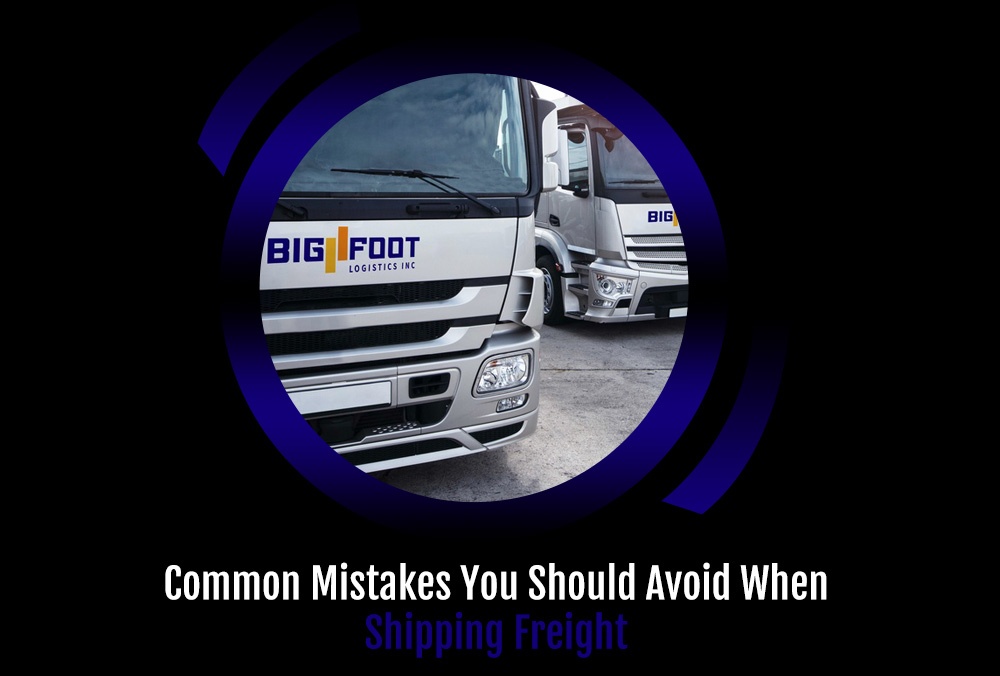Common Mistakes You Should Avoid When Shipping Freight

Transporting cargo, goods, or commodities by truck can help to speed up supply chains and save time. However, if mistakes get made during the planning stage, it can lead to bottlenecks which can hurt your bottom line.
Therefore, to help you avoid some basic errors that could prove costly, Big Foot Logistic Inc. has put together a list of the most common mistakes you should avoid when shipping freight.
1. Bill Of Lading (BOL) inaccuracies
The key document required for every freight shipment is The Bill of Lading. It is a legally binding document that gives the carrier and driver all the details necessary to process and invoice the freight accurately. However, considering the amount of specific information that must get documented, It’s not uncommon for shippers to make mistakes.
Mistakes made by shippers include:
- Use the wrong commodity description
- Enter the wrong piece count
- Forget to notify the party
- Fail to read the terms and conditions
Mistakes like these can be highly costly and easily avoided by carefully filling out the information. Engaging the help of someone to double-check also goes a long way to ensure its accuracy.
Going the extra mile may seem unnecessary, but you should remind yourself what’s at stake when things aren’t 100% accurate, your products, and your business’ reputation.
2. Incorrect weight or freight class listing
Yes, it’s part of the BOL, but it’s important enough to have its own listing. Keep in mind that improperly listed freight class or weight can be a costly mistake. For example, If you try to guess your shipment’s weight without the aid of a weigh station, you will inevitably receive additional fees; the same goes for improper freight class.
In addition, since a lower class is associated with a lower price, shippers sometimes try to list their shipment in the lowest possible category. But if they’re incorrect, the reclassification fee will be much higher than the margin from one class to another.
It may not seem like a big deal to some, but if you’re shipping hundreds or thousands of freight loads a year, those additional fees can add up fast. Not to mention the damage it does to a reputation.
3. No freight insurance
To cut costs, shippers may opt to avoid insurance. It may be cheaper in the short run, but the law of averages will come back to bite you. The simple frequency of continuous shipping over time will inevitably lead to damage.
Significant damages occur due to:
- Trucks overturning
- Natural disasters
- Accidents
Therefore, human errors must be taken into consideration, and the likelihood of a mistake occurring increases with travel distance and package handling. You could also be the victim of theft.
The relatively small price of insuring the goods saves you from worrying about the inevitable mishaps that are bound to happen over time and protect you from what could be financially crippling replacement costs of an entire shipment.
4. Relying on a single carrier for all shipments
Some shippers rely on one carrier for all their transportation needs. While it’s reasonable to form trusting relationships, if you choose to depend on one vendor alone to handle all your shipping can cost you big time. If the carrier experiences a strike or downsizes its facilities, you can find container loads of freight piling up and nobody to move it. To ensure you don’t have all your eggs in one basket, it’s wise to have contacts with several carriers to enjoy competitive rates and flexible operations.
5. Failing to understand shipment services
Shippers must understand the consignee’s capability to receive freight. For example, if the consignee doesn’t have a lift gate when the cargo requires one, the shipment could be returned to the carrier’s terminal. The carrier will provide a lift gate and add a redelivery charge to the invoice. As a result, knowing where your freight is going, and assigning the proper services to your shipment in advance, are essential factors in maximizing effectiveness and efficiency.
6. Neglecting delivery receipt
Consignees should inspect all freight they receive and note any abnormalities before signing the delivery receipt. If the damage gets omitted on the delivery receipt, it will not be easy to recover any costs with an insurance claim. Shippers and carriers can point to a clean delivery receipt and claim any damage must have occurred after delivery. Remember there are possible damages pending inspection.
To avoid these and other mistakes, reach out to the experts at Big Foot Logistic Inc. As an experienced trucking and logistics company in Spruce Grove, Alberta, we offer long-distance specialized trucking and Hotshot shipping (also known as same-day shipping). These services utilize a dedicated truck to deliver freight exclusively. The major products we haul are Oilfield hauling, Construction material transportation, General equipment moving, Hotshots, and Power Only (Plant and Equipment).
We serve clients across Spruce Grove, Fort Saskatchewan, Calgary, Fort McMurray, Edson, Innisfail, Grande Prairie, Mildred Lake, Edmonton, Wainwright, and Redcliff. We also cover Whitecourt, Red Deer, Saskatoon, Regina, Moose Jaw, Winnipeg, and the surrounding areas.
For a complete list of our services, please click here. If you have any questions about our trucking rates and logistics solutions, we’d love to hear from you. Please get in touch with us here.